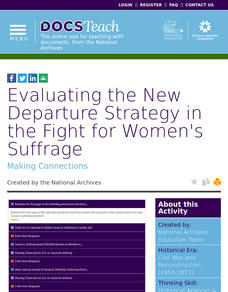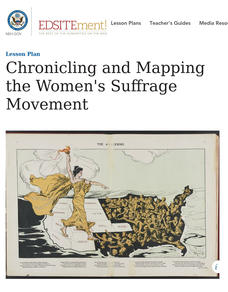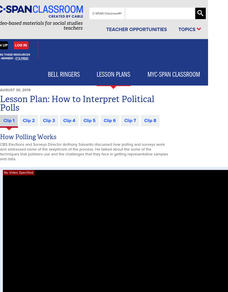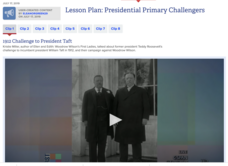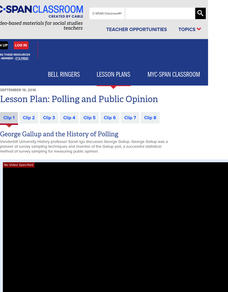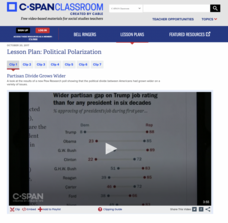DocsTeach
Evaluating the New Departure Strategy in the Fight for Women's Suffrage
When women demanded their right to vote, did the Constitution already protect it? The New Departure Strategy in the women's suffrage movement made this claim through court hearings. Using documents, such as transcripts from Susan B....
DocsTeach
Comparing Civil War Recruitment Posters
African Americans fought in the Civil War, and they were recruited by both the Union and the Confederacy! By comparing the wording of posters—one directed at freedmen and another to the owners of enslaved people—young historians discover...
DocsTeach
A Petition for the Cotton Gin
While almost forgotten today, the cotton gin could be seen as one of the causes of the Civil War. The innovation led to more cotton production, which in turn undermined political power balances in the 1800s. Individuals unpack the...
National Endowment for the Humanities
The Gulf of Tonkin Resolution and Escalation of the Vietnam War
The Gulf of Tonkin Resolution propelled America's involvement into a bloody conflict—and it was based on a fallacy. Using the resolution and other documents from the Vietnam War, including declassified documents, young historians...
National Endowment for the Humanities
Ratifying the Constitution
Ratifying the Constitution was no simple task. Using primary sources, such as classic writings from the Federalists and Anti-Federalists, young scholars examine the arguments for and against the Constitution. They then decide: Would they...
National Endowment for the Humanities
The Creation of the Bill of Rights: “Retouching the Canvas”
While the Constitutional Convention lay the foundation of the new government for the United States, the protections given under the Bill of Rights were controversial. Using documents, such as James Madison's and Thomas Jefferson's...
National Endowment for the Humanities
Empire and Identity in the American Colonies
The American Revolution was born out of a European conflict that spilled over into North America—and the documents prove it! Using primary sources from the era of the French and Indian War, including British plans to try to unite its...
National Endowment for the Humanities
The Mexican Revolution
The legacies of the Mexican Revolution are visible today—even if some history classes don't cover them. Using primary sources from leaders in Mexico at the time of the popular uprising and other evidence, such as railroad maps, young...
National Endowment for the Humanities
The Matter of the Philippines
The United States won the Spanish-American War, so now what? Young scholars act as advisors to President McKinley and use primary sources to recommend what America should do with its territories. Using a variety of perspectives—including...
National Endowment for the Humanities
The Spanish–American War
The Spanish-American War propelled the United States to the world stage and helped create the modern super power. Using web-based primary sources and a WebQuest format, young scholars consider the causes and outcomes for the war. Working...
National Endowment for the Humanities
The Question of an American Empire
As it rose to being the new super power, America had a choice: conquer other nations like its European predecessors, or stay home. Using primary source documents from those thinking about American foreign policy in the late 1800s,...
National Endowment for the Humanities
The Power of the Majority over Thought
While Alexis de Tocqueville mourned a lack of "freedom of discussion" in America in the early republic, today's pupils are concerned about peer pressure. Using excerpts of de Tocqueville's writing and discussion questions, scholars...
National Endowment for the Humanities
Chronicling and Mapping the Women's Suffrage Movement
While women's suffrage is often believed to be the result of a single constitutional amendment, the effort of women to secure the vote spanned decades and continents. Using primary sources in online archives, class members explore the...
National Endowment for the Humanities
Oyez! Oyez! Oyez!: Simulating the Supreme Court
Students have freedom of speech—or do they? Using an actual court case and research materials on the Supreme Court, young legal scholars examine the Supreme Court's role and history. Then, they argue a case the court declined to hear and...
National Endowment for the Humanities
“From Time to Time”: Presidents and Communicating with the Public
While the Constitution requires a "State of the Union" address, it doesn't give many details. In fact, it wasn't until Woodrow Wilson that the periodic update to Congress was given in-person. Using primary sources, recordings and...
C-SPAN
How to Interpret Political Polls
While numbers don't lie, the reliability of information in a poll may be difficult to discern. After viewing video clips with polling experts, young scholars consider how polls work and the elements of a reliable poll. Extension...
C-SPAN
Big Data and Politics
Movie selection means more than entertainment. Learners consider what information Netflix gathers to understand the concept of "big data." Resource includes clips of experts talking about corporations that harvest the details of our...
C-SPAN
Survey Analysis- Public Perceptions of Voting and Elections
The perception of fairness in elections becomes more important with each passing election. Using data from a C-SPAN poll, budding historians consider the differences between how people perceive elections. The resource includes videos of...
C-SPAN
Presidential Primary Challengers
A formidable opponent can shake up the election of an incumbent president. Class members explore the results of the elections of 1912, 1968, 1976, 1980 and 1992 using video clips. A chart helps pupils organize their thoughts and analysis.
C-SPAN
Presidential Candidate Firsts
Hilary Clinton may have been the first woman to run for president on a major party ticket, but she was only one example of an historic candidacy. Class members use video clips curated from C-SPAN to examine historical firsts in...
C-SPAN
Polling and Public Opinion
Polls are ubiquitous in American politics, but just how reliable and equal are they? A video-driven resource helps learners discuss the question by examining what pollsters and pundits say. Extension activities involve evaluating the...
C-SPAN
Political Polarization
Dive into the political breach with pupils and explore the reasons for political polarization. Using clips from C-SPAN that include discussions from reporters and scholars, class members consider what is causing the political fault lines...
C-SPAN
The Impact of Citizens United v. FEC
What began as an effort to show a movie by an interest group has impacted financing of federal elections. Did the Citizens United case lead to more "dark money" in politics, or did it shine a light with more speech? Using video clips...
C-SPAN
Why Do Americans Not Vote in Elections?
In an age of inflamed politics, who votes, who doesn't vote, and why are the questions everyone is trying to answer. Pupils listen to scholars, journalists and data crunchers on voting statistics to make their own conclusions. A chart...


